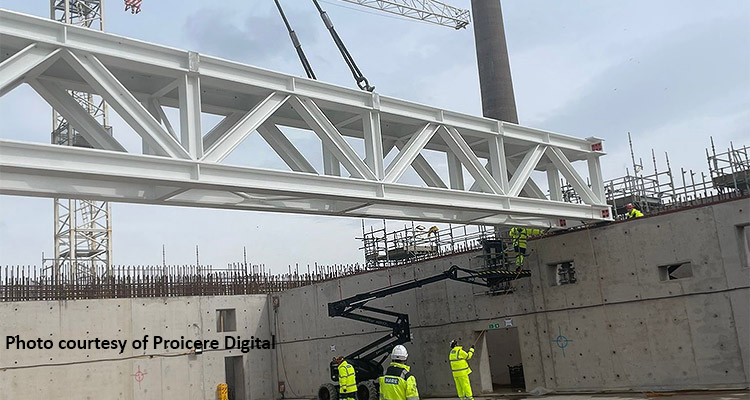
How AI-driven information management helps mitigate the risks of climate change in construction
While there has been much focus on how the construction sector can decarbonise and reduce its contribution to climate change, not enough attention has been given to the physical risks a changing climate will bring to construction sites – and how to mitigate them.
As global temperatures continue to rise, Britain is likely to experience warmer and wetter winters, as well as hotter and drier summers. The warmer climate will also mean more severe weather events including heatwaves, intense precipitation, and high-velocity winds. As a consequence, construction projects face increased risk of economic losses and safety hazards.
How weather extremes affect construction sites
The vulnerability of the sector to extreme weather was highlighted in July 2022. According to the Office of National Statistics, the heatwave, which brought record-breaking temperatures, contributed to the construction sector’s 0.8 percent productivity decline – valued at £114 million – that month.
Climate change adversely impacts construction projects in three key ways. First, is the increased likelihood of delays and disruption, resulting principally from stoppages, inability of workers, equipment and materials to reach the site. Other factors to consider include concrete curing time in wet conditions, and access to water in a drought. Studies show extreme weather can extend project timelines by up to 21 percent, leading to missed deadlines and financial penalties.
Second is reduced worker safety. Extreme heat increases the risk of heat stress and dehydration. The impacts of heat stress are felt above 26°C on the Wet Bulb Globe Temperature Index, with risks to health sharply increasing as temperatures rise above this threshold. Physical exertion at higher temperatures also causes impaired judgment which in turn increases the risk of accidents.

A third consequence is the deterioration in site conditions. Flooding and raised water tables prevent operations such as excavation and tunnelling, while high winds make lifting and working at height more hazardous, and the need to take extra precautions to secure equipment on-site.
The increasing complexity of project planning
A changing climate, therefore, makes project planning more complex. First, unpredictable, fast-changing weather requires the ability to quickly update schedules and site models at short notice. Furthermore, with so many factors to consider, determining the probability of outcomes and their impacts on budget or timelines becomes almost impossible without the help of sophisticated digital tools.
AI-driven information management can be effective in overcoming these challenges. By integrating predictive analytics, real-time updates, and advanced planning capabilities, AI-driven digital project controls have the potential to improve construction project management and build resilience against the mounting risks posed by climate change.
The role of advanced digital project controls in climate-resilient construction
The solution is a digital integration into project controls. This results in an interactive, dynamic model of a construction site throughout its lifecycle. Its capability for fast updates, taking just minutes, means that adjustments to plans based on actual site conditions can be made and, for example, shared without significant loss of time. Risks such as spatial clashes can be avoided before work starts, and clear visualisation allows teams to easily understand the site and schedule.
Precise, localised weather predictions
Integrating AI with 4D planning enables teams to adapt more quickly to weather disruptions while adopting safer construction practices, and more efficient planning.
AI-driven weather models can predict extreme weather events with remarkable accuracy. Using vast amounts of data from satellites, sensors, and weather stations, these systems generate localised, time-specific forecasts. AI models can generate multiple forecasts to capture the complex behaviour of the atmosphere, providing a range of potential scenarios.
A major breakthrough in AI-driven weather prediction is Google’s DeepMind project, which was found to outperform conventional forecasts in 97 percent of scenarios, providing 15-day forecasts in eight minutes.
Dynamic scheduling and risk analysis
Integrating AI-generated weather forecasts into construction schedules allows project managers to adjust timelines to avoid disruptions, set up contingency plans and analyse risks to worker safety and site conditions, enabling proactive mitigation strategies.
This is particularly advantageous for modelling of safety routes, or optimising work schedules to minimise worker exposure to heat stress, for example.
The increasing impact of weather
Certainly, contractors should be looking at how to reduce the risk of climate change onsite, as its impact is already affecting the sector’s performance. A recent report found that three-quarters of construction managers already say that weather is impacting UK and European construction projects, causing delays that have resulted in missed deadlines or financial penalties. If we are to expect more extreme events, the cost of not modernising project controls will only go up.
Integrating advanced technologies such as AI and 4D planning is no longer optional: it is essential for the sector’s future prosperity.
By Dan Ashton
Dan Ashton is Project and Programme Services Director at Proicere Digital, an AI-driven consultancy focused on digital transformation and project controls, dedicated to simplifying complex challenges for businesses and projects. The company currently works with clients on large-scale complex projects and programmes, including the Sellafield nuclear site. Proicere Digital serves a number of sectors in addition to construction, including retail, food & drink, logistics, manufacturing and education.
Proicere Digital’s solutions include AI-driven data analytics, digital transformation strategies, cloud services, and enterprise IT operations.